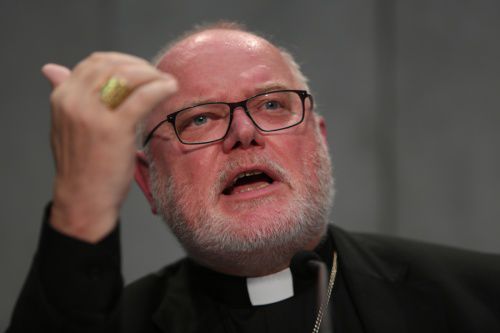Last week, the German bishops’ conference announced it is changing its labor laws such that contracting a civil marriage after divorce or entering a same-sex civil union cannot result in termination of employment except in “exceptional cases.” “Only in special circumstances and therefore only in exceptional cases can these forms of conduct lead to a termination of contract,” read a May 5 statement released by the German bishops’ conference. The statement was translated into English at Rorate Caeli. The move, which the German bishops say is an adaptation to changes in “legislation and society,” follows on the heels of their synthesis of responses to a questionnaire sent in preparation for the Synod on the Family being held in October, which noted the “considerable expectations among many faithful” of a “further development of the Church's teaching and pastoral care in questions related to marriage and family.” Questions of marriage and family have taken the spotlight amid the Synod on the Family that took place last year in the Rome, and the one that will take place there this fall. Several dioceses in the U.S. — including those of Columbus, Cincinnati, and San Francisco — have in recent years upheld or adopted employment policies which strengthen expectations that Church employees will not contradict Church teaching in their professional and public lives. The German bishops' statement noted that the Plenary Assembly of the Association of German Dioceses revised the labor law on April 27. Two changes regarded the collective labor law, bolstering the right to organize unions and the right of unions to operate in ecclesial institutions. “In the area of the individual Labor Law, certain demands,” the bishops continued, “have been adapted according to changes in jurisdiction, legislation, and society.” The adaptations regard “demands of loyalty.” The statement begins by emphasizing that “termination of contract is only the last and final resort” with regard to violations of loyalty; it must have been preceded by rebuke, warnings, transfer, etc. Violations against loyalty, according to the German bishops, include “public engagement against fundamental principles of the Catholic Church (e.g., the propagation of abortion or of xenophobia), the leaving of the Catholic Church, or conduct that is hostile toward the Church.” However, entering a second, civil marriage following divorce, or entering a homosexual civil union, is not in itself a violation against the demand of loyalty, according to the German bishops. Contracting a second civil marriage without an annulment or contracting a gay civil union “is generally to be regarded as a grave violation against loyalty,” the bishops said, “if such conduct according to the concrete circumstances is objectively prone to cause an enormous disturbance within the service community or within the professional sphere of influence and to affect the credibility of the Church in a negative way.” As an example of under which circumstances a second marriage could disturb a service community, the bishops offer that the remarried partner would have to shirk the legal duties of his first marriage. “The Church's Labor Law does not know any form of automatic termination of contract,” the bishops emphasized. “Whether it is possible to continue an employment, after a violation against the duties stemming from the employment contract, always depends upon the conditions of the individual case.” The German bishops said that “certain professional groups” have a higher expectation of loyalty than others, and that the newly adopted norms do not apply. These groups include those in the fields of pastoral care, catechesis, or those who have a canonical mandate from their bishop to teach in a Catholic school. The statement concludes saying that each German diocese will establish “a central office that shall be consulted before sentencing a termination of contract because of a violation of loyalty.” Moreover, another committee “will examine the question as to whether the Church's Labor Law can be further strengthened institutionally.” The German bishops' statement began by noting that the adaptations were the fruit of considerable time and consultation: “During the recent years, this current decision was prepared for by an episcopal working group and already discussed several times by the bishops themselves.” According to Reuters, a spokesman for the Church in Germany said more than two-thirds of Germany's dioceses voted in favor of the adaptation, “indicating some opposition.” The synod questionnaire synthesis in Germany similarly maintained that admitting the divorced and remarried to the sacraments “remains a pivotal issue for the credibility of the Church.” Cardinal Paul Josef Cordes, who is president emeritus of the Pontifical Council Cor Unum, has called similar statements from Cardinal Reinhard Marx of Munich and Freising — president of the German bishops conference — “the result of an 'obedience that goes ahead', a deeply political strategy which creates 'facts' in order to dominate the process of decision-making and to put pressure on their colleagues” at October's Synod on the Family. Some commentators have also voiced fear that the large income the Church in Germany receives from the state may serve to neuter its voice of Christian witness in the public sphere. “Because of the decades-long connection of Church and State taxation system, financial offices etc. there is dependence,” Martin Lohmann, a Catholic author and spokesman of the advocacy group Christian Action in Germany, told CNA in February. “The last years and decades there is a fear from the side of the bishops to proclaim the truth in social-political topics since they want to avoid a hostile reaction from the parties.” Lohmann added that the Church loses financially if it upholds less popular teachings on divorce and contraception. Preaching about that means losing “paying customers,” he said; and “softening” these teachings means more money for the Church. As long as this is the case, the Church, in Lohmann's view, “will remain limited and not-free, darkened, and in a state without courage to proclaim the truth.”

